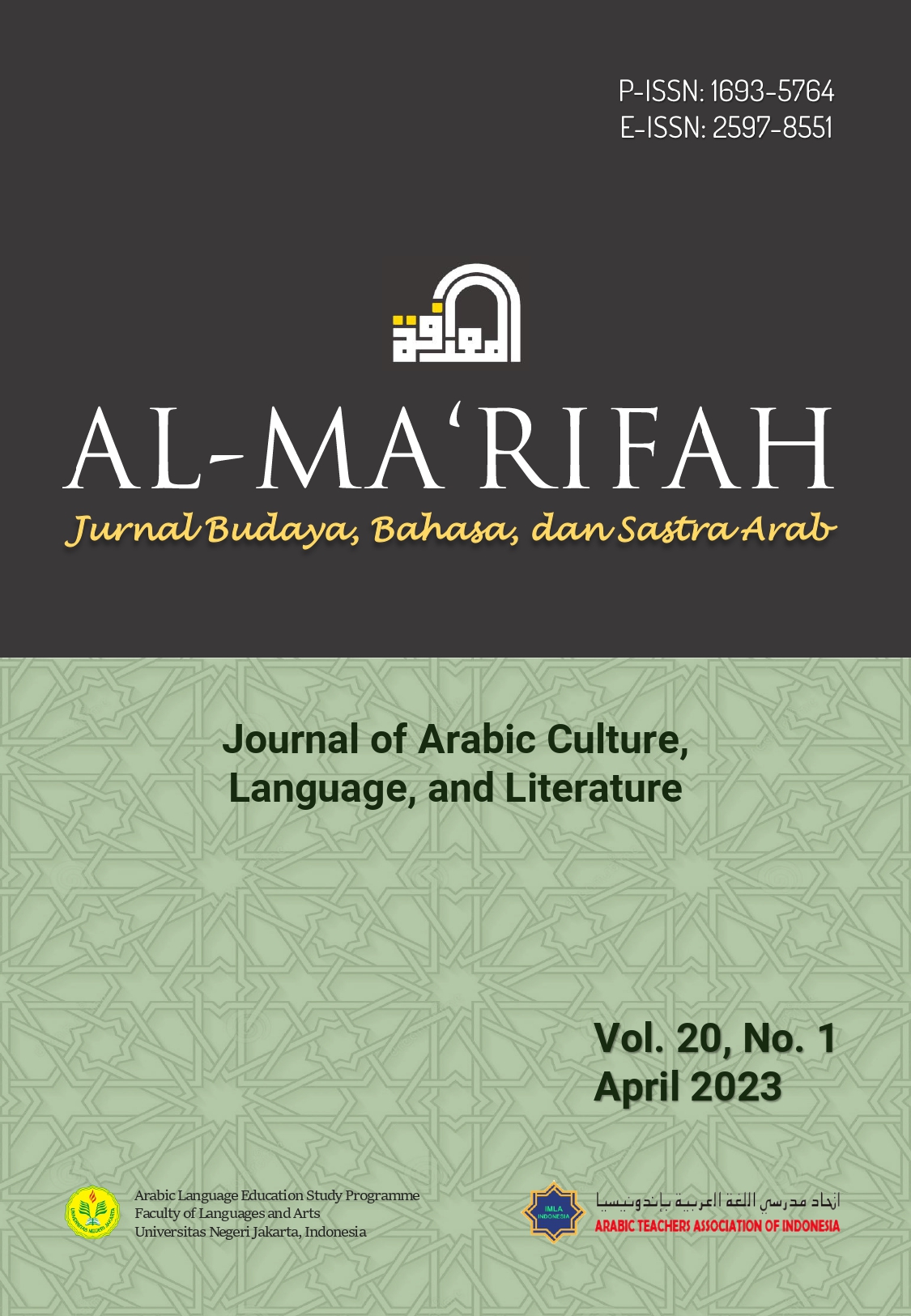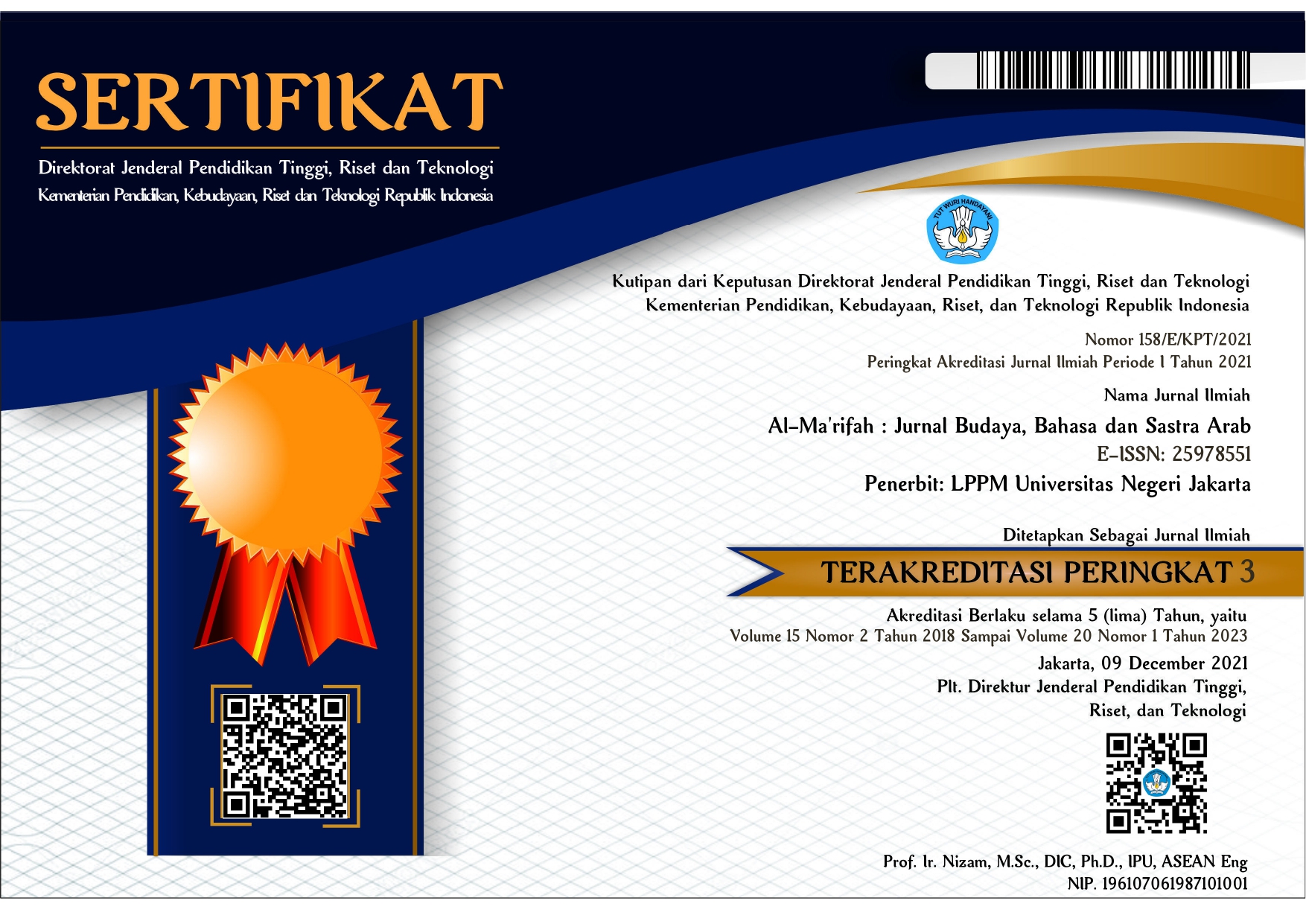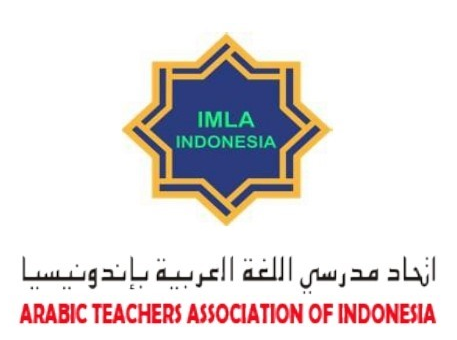Abū al-Qāsim al-Zajjājī dan Proses Selection-Choice dalam Membangun Argumen Naḥwu: Kajian Uṣūl al-Naḥwi
DOI:
https://doi.org/10.21009/almakrifah.20.01.02Keywords:
al-Zajjājī, Basrah–Kufah, uṣūl al-naḥwi, selection choiceAbstract
This research focuses on the thought of Abū al-Qāsim al-Zajjājī and his contributions in naḥwu. By using descriptive qualitative approach, it was found that al-Zajjājī, who lived in the third and fourth centuries of the Hijriyah in Baghdad, with the style “khalaṭa al-madhabayn” tradition, compromised the Basrah and Kufah schools, in other terms, selection (ikhtiyār) and choice (intikhāb) opinions his predecessors. Such traditions have a strong contribution in influencing how al-Zajjājī studied and argued. Through selection and choice, al-Zajjājī proves that it is okay to take opinions from any circles, even through selection and choice it can help explain language phenomena as an introduction to classifying them into special discussions and things similar to them with the aim of expressing the language system with not fanatical to any one sect. The history above also plays a role in having a positive impact towards the maturity of naḥwu studies in subsequent generations, namely the Andalusian naḥwu network with all its past opinions then formulates or applies principles to naḥwu which are more mature and established.
References
Ahmad, M. S. M. (2015). Tawāfuq qirā’āt al-qurrā’ al-sabʻah maʻa madhhab al-Kūfīyīn al-nahwī. Amārābāk, 6(18), 1–22. Retrieved from https://search.emarefa.net/detail/BIM-675323
al-As‘ad, ‘A. K. M. (1992). al-Wasīṭ fī tārīkh al-naḥwi al-ʻArabī. Riyadh: Dār al-Shawāf.
Fachruddin, A. A. (2021). Linguistik Arab: Pengantar sejarah dan mazhab. Yogyakarta: DIVA Press.
al-Faḍlī, ‘A. H. (1986). Marākiz al-dirāsāt al-naḥwīyah. Zarqa, Jordan: Maktabat al-Manār.
Gani, S. (2020). al-Qiyās dalam uṣul al-naḥwi. ‘Ajamiy : Jurnal Bahasa dan Sastra Arab, 5(1), 1–12. doi:10.31314/ajamiy.5.1.1-12.2016
Hidayatullah, M. S. (2017). Cakrawala linguistik Arab. Jakarta: PT Grasindo.
Holilulloh, A. (2020). Pengaruh mazhab naḥwu Kūfah dalam kitab Matn al-Ājurrūmīyah. Al-Ma‘rifah: Jurnal Budaya, Bahasa, dan Sastra Arab, 17(2), 139–148. doi:10.21009/almakrifah.17.02.04
al-Ḥifnī, ‘A. M. (2000). al-Mu‘jam al-shāmil li-muṣṭalaḥāt al-falsafah. Cairo: Maktabah Madbūlá.
Ibn Khalikān. (1980). Wafayāt al-aʻyān wa-anbā’ abnā’ al-zamān ( I. ‘Abbās, Taḥqīq., Vol. 3). Beirut: Dār Ṣādir.
Ibn Maḍā’ (1979). al-Radd ‘alá al-nuḥāt (I. al-Bannā, Taḥqīq). Cairo: Dār al-I‘tiṣām.
Ihsanudin. (2017). Sejarah perkembangan mazhab nahwu Arab: Sebuah tinjauan historis. Thaqafiyyat : Jurnal Bahasa, Peradaban dan Informasi Islam, 18(1), 72–85. Retrieved from https://ejournal.uin-suka.ac.id/adab/thaqafiyyat/article/view/1309
al-Jundī, F. (2019). Dirāsāt muwāzanah bayna manhajay al-Zajjājī wa-Ibn al-Fakhkhār fī sharḥ al-Jumal. Majallat Kulliyat al-Lughah al-ʻArabīyah bi-Itāy al-Bārūd, 32(4), 3329–3453. doi:10.21608/jlt.2019.64920
Kridalaksana, H. (2001). Kamus linguistik. Jakarta: Gramedia Pustaka Utama.
al-Khūlī, A. (1961). Manāhij tajdīd fi al-naḥwi wa-al-balāghah wa-al-tafsīr wa-al-adab. Cairo: Dār al-Ma‘rifah.
Luthfi, K. M. (2020). Epistemologi naḥwu [pedagogis] modern. Yogyakarta: Zahir Publishing.
Marmorstein, M. (2016). Tense and text in classical Arabic: A discourse-oriented study of the classical Arabic tense system. Leiden: Brill.
al-Mubārak, M. (1984). al-Zajjājī: Ḥayātuhu wa-āthāruh wa-madhhabuh al-naḥwi. Damascus: Dār al-Fikr.
al-Muhaymid, A-R. (2017). Abū al-Qāsim al-Zajjājī and his effect on the Quranic lesson. Journal of Islamic Sciences, 10(3), 1025–1090. doi:10.12816/0048674
Raswan. (2015). Ijtihad-ijtihad (interpretasi) kebahasaan Tammam Hassan. Al-Ma‘rifah: Jurnal Budaya, Bahasa, dan Sastra Arab, 12(1), 53–69. doi:10.21009/almakrifah.12.01.06
Tamimulloh, T. (2014). al-Baṣīt fī uṣūl al-naḥwi wa-madārisih. Yogyakarta: Lentera Kreasindo.
Tanzeh, A. (2009). Pengantar metode penelitian. Yogyakarta: Teras.
Versteegh, K. (1995). The explanation of linguistic causes: Az-Zaggagi’s theory of grammar. Amsterdam/Philadelphia: John Benjamins Publishing Company.
Versteegh, K. (2017). Greek Elements in Arabic Linguistic thinking. Leiden: Brill.
al-Zajjājī, A-Q. (1979). al-Īḍāḥ fī ʻilal al-naḥwi (M. al-Mubārak, Taḥqīq). Beirut: Dār al-Nafā’is.
al-Zajjājī, A-Q. (1984). al-Jumal fī al-naḥwi (‘A. T. al-Ḥamad, Taḥqīq). Beirut & Irbid: Mu’assasat al-Risālah & Dār al-Amal.
al-Zubaydī, A-B. (1983). Ṭabaqāt al-nahwīyīn wa-al-lughawīyīn. Cairo: Dār al-Ma‘ārif.
Downloads
Published
How to Cite
Issue
Section
License
Copyright (c) 2023 Mukhammad Lutfi

This work is licensed under a Creative Commons Attribution 4.0 International License.











